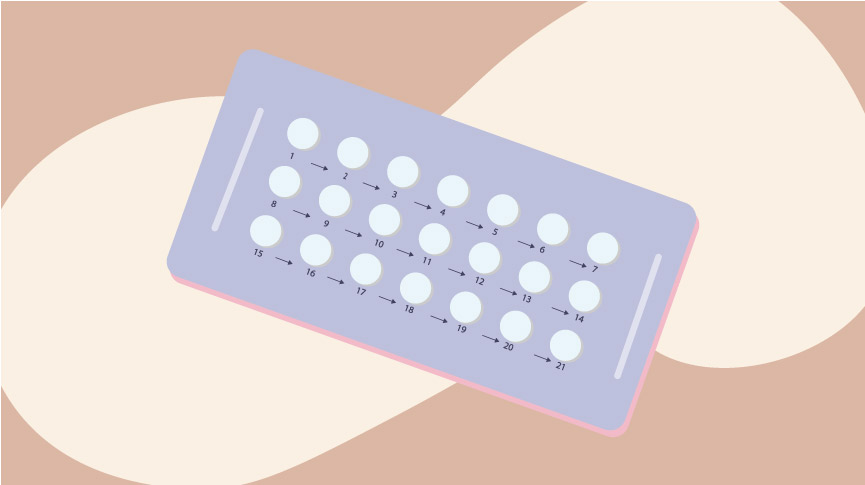How Does Using Birth Control Affect Your Period?

It’s true that most women have experimented with birth control, many of which have used it for a prolonged period of time. And while there are different types of birth control, they all essentially do the same thing: prevent pregnancy. This, in itself, has been a lifesaver for so many women across the globe.
At the same time, there are side effects and other things to be mindful of when you take birth control. Just because all of them are taken or used in an attempt to not get pregnant doesn’t mean that they all have the very same effects on the body.
How Birth Control Affects Your Period?
So, today, we’re going to be talking about the different methods of birth control, and how each of them affect your period. This is not only a super informative ‘cheat sheet’ shall we say for those taking (a certain kind of) birth control for the first time. It’s also great for those who are currently using birth control. Knowledge is power, and you may just learn something entirely interesting when it comes to how certain birth control methods affect your period.
Different Types of Birth Control
Arguably, ‘the pill’ and condoms are the most popular form of birth control. But there are so many other types of birth control out there:
- Diaphragms: A circular dome made of soft silicone that is inserted into your vagina before sex
- Contraceptive implants: A small, flexible, plastic rod that’s placed under the skin in your upper arm
- The contraceptive injection: An injection, which usually lasts between eight to 13 weeks, that releases the hormone progestogen into your bloodstream to prevent pregnancy
- The contraceptive patch: A small, sticky patch that releases hormones into your body through the skin
- Female condoms: Usually made of synthetic latex, or latex, and is worn inside of your vagina to prevent semen from entering the womb
- Male Condoms: Usually made of latex, a sheath that’s placed over the penis to prevent semen from coming into contact with a partner
- IUD’s: Intrauterine Device, a T-shaped copper device that’s put inside of your womb and lasts for five to 10 years to prevent pregnancy
- IUS’s: Intrauterine System, a T-shaped plastic device that’s put into your womb, being effective for three to five years, and releases the hormone progesterone to prevent pregnancy
- The pull-out method: A man will “pull out” right before ejaculation so that semen doesn’t enter your vagina
- The contraceptive pill: A pill taken once a day that releases oestrogen and progestin
- The progestogen-only pill aka the ‘mini pill’: A pill taken once a day that prevents pregnancy by thickening the mucus in your cervix to stop sperm from reaching an egg
- Vaginal rings: A small, soft, and plastic ring that’s placed inside of your vagina, and releases oestrogen and progestogen into the bloodstream
- The emergency morning-after pill: A pill that can be take after unprotected sex to prevent pregnancy
And then there are also two permanent methods of contraception:
- Hysterectomy in women: a surgical procedure to remove the womb, making it impossible to get pregnant
- Vasectomy in men: a surgical procedure that cuts and seals the tubes that carry sperm, making it impossible to impregnate someone
How Does Each Birth Control Method Affect Your Period?
After having mentioned all of the modes of birth control, there are some that would have no effect on your period whatsoever. For that reason, we’ll only be looking at those that do.
The Contraceptive Injection
The injection works similarly to the hormonal IUD. In other words, you may experience irregular bleeding for up to four months, but after this, the bleeding will subside, cause spotting, or go away completely.
The Contraceptive Implant
During the first six to 12 months, you may experience irregular bleeding, such as spotting. But, for the most part, having the contraceptive implant usually leads to lighter periods. In fact, it’s been said to not only lighten one’s period, but also help with painful period cramps and symptoms of PMS. A study showed that 75 percent of those who had used the contraceptive implant found that they experienced fewer bleeding/spotting days than with a natural cycle, and 77 percent found significant improvement in dysmenorrhoea (painful periods).
The Contraceptive Patch
During the first menstrual cycle after using the patch, you may experience breakthrough bleeding or spotting. After this, it may cause bleeding irregularities. This is just your body getting used to the patch, and isn’t something to be concerned about. In fact, a small study revealed that less than one in 10 users stopped using the patch because of bleeding and spotting.
The IUD
The copper IUD doesn’t really impact your period in the long run because it doesn’t contain any hormones. However, it has been shown to produce heavier bleeding and some spotting for the first few months of it being inserted. If you’re opting for the hormonal IUD, this is a different story. With this kind of IUD, you may experience extremely light periods, or no period at all. There may be a chance of spotting now and again though, which means having a tampon, pad, or menstrual cup on-hand is a good idea.
The Contraceptive Pill
The contraceptive pill can impact everyone differently, but for the most part, it can shorten the duration of your period. It can also minimise bleeding. So, in the case of someone having, say, a five to seven day period, the contraceptive pill could lead some to have a three to four day period. It can also help to regulate your period.
The Progestogen-Only Pill
If you are taking this ‘mini pill’ it could induce lighter periods and could even reduce the amount of painful cramps. The thing about this pill however is that it must be taken at the same time everyday. If not, the efficiency and benefits of it may diminish.
The Vaginal Ring
The vaginal ring works similarly to the contraceptive pill, but has a leg up! That’s because you don’t have to remember to take a pill every single day. If you have or plan to use the vaginal ring, you will most likely experience way less bleeding and a more regulated period. Using this kind of birth control means changing the vaginal ring on the correct day every month.
The Morning After Pill
Taking the morning after pill can definitely affect the length of your menstrual cycle. By this we mean, it could come earlier or it could come later. A more precise explanation: if you take this pill in the first three weeks of your cycle, you’re more likely to get your period early. But, if you take it in the later part of your cycle, it may be delayed. Essentially, the earlier you are in your cycle, the sooner your period will come. This pill may also cause your period to last longer than normal, and some women may experience spotting between periods. It’s important to know that the morning after pill is not suitable as a regular method of birth control, but only used in an emergency after unprotective sex.
So, while we’ve taken a careful look at how each of the birth control methods affect your period, there are more things to consider when deciding which one is right for you. With so many options however, there’s surely a birth control method that simply works well with your body and your symptoms so you can live a happier and healthier life.

Helena is a sex-positive South African writer who loves swimming in the ocean under the full moon and cheesy 90’s pop. She’s currently living her best life in Porto, Portugal after scouring different continents to find her happy place.


